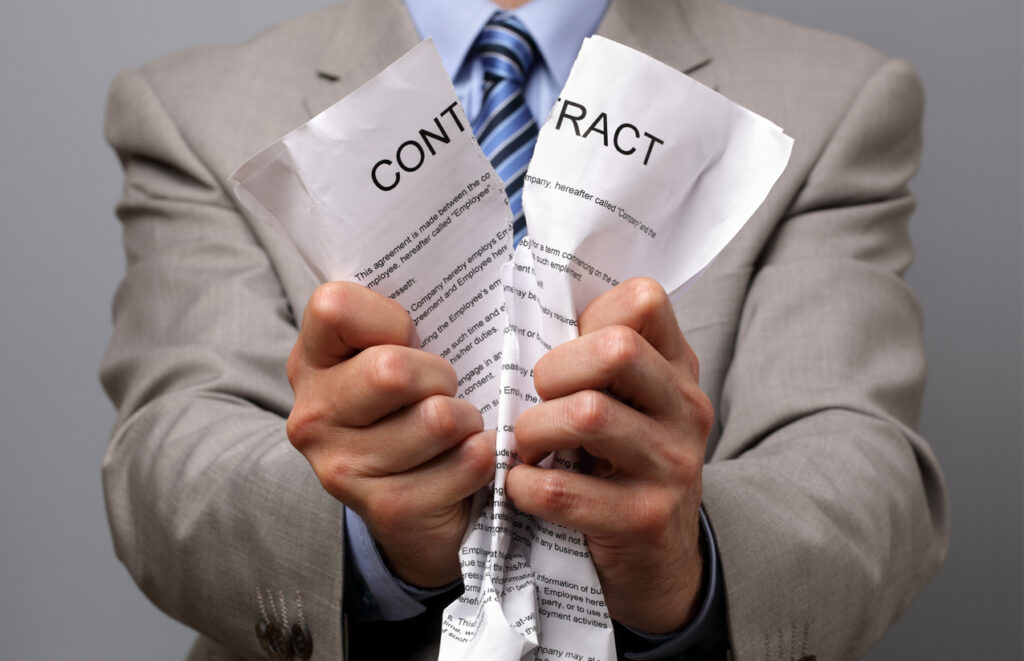How Are Contract Disputes Settled?
Your business’ contracts are tools for defining what is expected of different parties in a commercial relationship. Common contracts exist between employers and employees, between suppliers and buyers, and with independent contractors.
Disputes about the terms of a contract are almost inevitable. Some people think this is a drawback of contracts, but it’s actually evidence of their strength. If there were never any disagreements about how parties should operate, there would be no need for contracts in the first place. Contracts define what is expected of each party, and there are effective ways to resolve these disputes, often without souring the relationship that existed before the dispute. A contract law attorney can help direct you through some different strategies to resolve contract disputes.

Informal Complaint and Negotiation
A contract dispute starts when one party points out to the other party that the terms of the contract aren’t being fulfilled. For example, a contractor might say to the company that hired them that they haven’t been paid on time or in the amount specified in the contract. Or a company might believe that their landlord isn’t providing the services required under their lease.
The next step is an informal negotiation. For example, the contracting company might tell a contractor that they will pay them immediately, or, perhaps, ask for a little more time to pay. The landlord may agree to provide snow removal in a more timely manner. If these resolutions are satisfactory, the contract dispute is settled.
However, if parties don’t accept these resolutions, parties may seek to escalate the dispute.
Escalation and Formal Negotiation
During this stage, the parties to a dispute will typically put their complaints in writing. The written complaints will typically include the terms in the contract that have supposedly been broken, how the wronged party wants to have these terms made right, and what they will do if they are not made right.
If parties haven’t consulted with their business lawyers before this point, this is the time to get lawyers involved. Talking to your contract law attorney can help you understand what recourses you have under the terms of the contract, and what level of negotiation you can enter into without affecting your ability to get compensation from other dispute resolution tools, such as arbitration and litigation.
Consulting with your lawyer can also help you avoid trouble for yourself by violating other terms of the contract inadvertently. Most importantly, talking to a business attorney can help you understand whether the contract dispute involves a minor breach that you can patch over, or a material breach that may make it impossible to continue under the current terms.
Formal negotiations can involve whoever the parties agree should be present, including the use of experts and mediators to try to resolve the dispute. Sometimes, though, the contract may put explicit limits on this stage of negotiation. Often, formal negotiations are the last chance to save a working relationship between parties in the contract. Other forms of resolution lead to increasing acrimony and may make one party feel slighted to the point that they can’t continue to work with the other.
If parties can’t resolve the dispute with formal negotiations, they will have to move to binding forms of dispute resolution, such as arbitration and litigation. Sometimes a contract will specify that disputes must be resolved with binding arbitration.

Binding Arbitration
If negotiations between parties fail to resolve contract disputes, people often seek resolution through binding arbitration. In this process, parties present evidence to a neutral third-party arbitrator who renders a binding ruling on the evidence and arguments presented. It’s similar to a trial, but it’s faster and less expensive.
Typically, once the arbitrator issues a ruling, the dispute is considered resolved.
Litigation
If parties don’t agree to arbitration, they may seek to settle their dispute through litigation. This is a lawsuit where parties file formal complaints against each other and seek to achieve restitution for wrongs related to violations of the contract.
Litigation involves multiple steps, including discovery, in which parties disclose documents related to the dispute. Before the trial, parties may file different motions to dismiss certain claims or in an attempt to conceal items from discovery.
Negotiations continue throughout the litigation process, and it’s possible for both parties to reach a settlement before going to trial.
At the end of a trial, either party has the option of appealing the decision to a higher court.
Help with Contract Disputes in Denver
If you’re a business owner, contract disputes can determine whether your business succeeds or fails. It’s important to have an experienced contract law attorney on your side to deal with these disputes when they arise.
Small business attorney Elizabeth Lewis has been helping businesses in Colorado since 2007. She focuses on helping small and medium businesses to use the law to their advantage and compete in a challenging marketplace. Alongside the importance of resolving contract disputes, she knows how important it is to maintain your professional relationships and reputation during the dispute process.
Elizabeth can help your company resolve these disputes without burning bridges along the way. Her results-oriented approach helps cut through animosity to reach a balanced resolution that satisfies everyone involved.
In addition to resolving contract disputes, Elizabeth can help you write contracts that prevent or minimize disputes. She can also help you review contracts so you don’t accept any onerous terms that could impair your business.
To learn how a small business lawyer can help your business with contract disputes, please contact the Law Office of E. C. Lewis today for a free initial consultation. We serve small and medium sized businesses in Denver and throughout Colorado.

